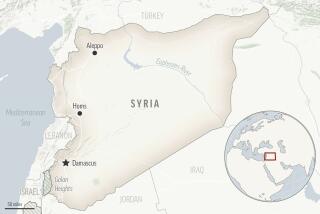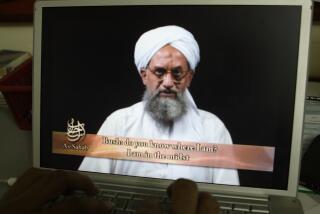Iran Holds Key Al Qaeda Member, U.S. Says
- Share via
WASHINGTON — Iran has in custody the top military commander of Al Qaeda, a former security chief for Osama bin Laden who is believed to be responsible for some of the terror network’s most destructive attacks, including the 1998 bombings of two U.S. embassies in Africa and recent strikes on residential compounds in Saudi Arabia, U.S. officials say.
The officials said Iran had detained Saif Adel, one of Al Qaeda’s most wanted leaders, and said the Bush administration was closely monitoring the situation, including possible efforts to return the Egyptian militant to his home country, a staunch U.S. ally in the war on terrorism, for interrogation and perhaps trial.
“We have reason to believe he is in some kind of custody [in Iran], but whether that means a jail cell or some kind of comfortable hotel suite, we don’t know,” said one U.S. official, adding that Iran has had Adel under wraps for “a couple of months.”
“They haven’t told us anything,” the official said of the Tehran government, even after requests for confirmation were made through intermediaries. The two countries have not had diplomatic relations since 1979.
Officials willing to discuss the matter requested anonymity because of the sensitive issues involved.
After Bin Laden and top lieutenant Ayman Zawahiri, Adel -- who is either 40 or 43 -- is believed to be the most powerful Al Qaeda leader at large. He is by all accounts a chief operative in the network’s efforts to regroup and launch new strikes.
U.S. officials in Washington and Saudi Arabia have said that Adel played a supervisory role in the May 12 attacks on three Western residential compounds in Riyadh, the Saudi capital. The attacks killed nearly three dozen people, including nine terrorists, and wounded 200.
The FBI has placed a $25-million bounty on Adel’s head for his alleged role in August 1998 embassy bombings, which killed at least 224 people in simultaneous blasts at U.S. embassies in Dar es Salaam, Tanzania, and Nairobi, Kenya.
The FBI says he is wanted on charges of conspiracy to kill U.S. nationals, murder and destruction of U.S. property.
On Wednesday, Iranian officials acknowledged holding some senior Al Qaeda members but refused to identify them.
“Since the collapse of the Taliban regime we have arrested a large number” of Al Qaeda members, Iran’s intelligence minister, Ali Yunesi, told reporters after a weekly Cabinet meeting. “Many of them have been expelled, and a large number of them are in our custody -- a mixture of big and small members.”
Yunesi’s remarks were believed to be the first public admission by a top Iranian official that Tehran was holding some key members of Al Qaeda. For months, Iranian officials have confirmed their detention of some Al Qaeda figures, but insisted that they did not know who they were or whether they were significant.
Last week, The Times reported that Iran had in custody several top Al Qaeda members, including Sulaiman abu Ghaith, a Kuwaiti who is considered the group’s spokesman.
Iran’s admission came two days after President Bush lashed out at Iran and Syria, accusing them of harboring terrorists.
For months, U.S. officials, including Bush, have said that Iran has provided a safe haven to Al Qaeda members, allowing the network to continue its operations despite a worldwide crackdown on its activities. U.S. officials also believe that Bin Laden’s son Saad and others have moved in and out of Iran.
According to diplomatic sources, Saudi officials played a crucial role in identifying the Al Qaeda operatives in Iran -- including several described as members of the group’s “board of directors” -- and in helping to persuade Iran to publicly acknowledge their presence.
More to Read
Sign up for Essential California
The most important California stories and recommendations in your inbox every morning.
You may occasionally receive promotional content from the Los Angeles Times.













